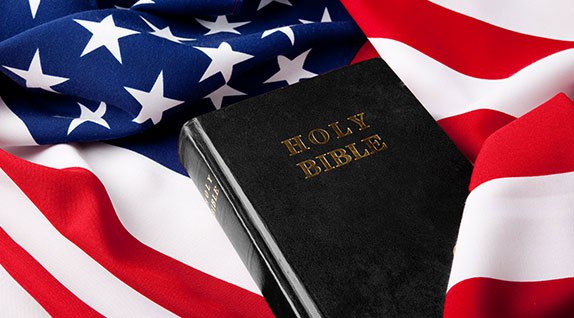Blog Post
America’s national identity was once defined by the Bible–and the Left destroyed it
By Jonathon Van Maren
I don’t remember any point, in my mere fifteen or so years of political awareness, ever hearing so many discussions about “nationalism.” To some, it seems, the word is a mere synonym for “patriotism,” and Donald Trump’s use of the world is simply one more indication of his commitment to putting America first. To others, the word appears to be extremely triggering, with the Left being prone to presenting it as a dog whistle for white supremacy.
Interestingly, Time Magazine recently published an essay by Yoram Hazony, author of The Virtue of Nationalism—and Hazony explains why the national identity that America has lost was extraordinarily important:
[I]t’s American nationalism that the U.S. needs right now. Never in our lifetimes have we seen America’s various tribes so divided, so intolerant of one another, so quick to delegitimize and even threaten violence. The mutual loyalty that has bound Americans together as a nation seems like it is disappearing. The bitter argument over ongoing large-scale immigration is only a proxy for this deeper issue: Can Americans ever unite again around a shared national story? Can they ever see themselves as brothers again?
The answer at the moment, after a quick survey of the viciousness and the vitriol leading up to the midterm elections, seems to be an unequivocal “no.” Elections are not being fought over who has better ideas for the future, they are now a brawl between factions which claim that the other is a fifth column bent on America’s destruction. As the factions fight to define America’s core identity, Hazony explains, the bizarre spectre of “white nationalism” has reared its ugly head once again:
But “white nationalism” is also misconceived because “whites” are not a nation: We’re familiar with the English, Dutch, French and Polish nations. They’re recognized by a common cultural inheritance, especially a distinctive language and religion, and by the bonds of mutual loyalty that come of centuries of joint struggle. The Polish nation, for example, is known by its Polish language, Catholicism and a long, painful history of striving for independence from Germany and Russia. By contrast, no “white” nation is found in any history book. There is no distinctive “white” language, religion or cultural inheritance. The idea that “whites” are a nation is just so much make-believe. Instead of deepening Americans’ pride in, and attachment to, the remarkable Anglo-American political and religious traditions that brought the United States into being, “white nationalists” conduct their parades under bizarre new flags they have invented for themselves: They prefer to replace the authentic American nationalist tradition with a concocted new racial identity that is just as much a break with the American past as the neo-Marxist revolution being proposed by the Left.
This is very true, and I’m glad that someone has finally said so in a mainstream publication. I’ve had long conversations with my politico friends about the alt-right in North America, and I’ve said often that the entire idea of “white nationalism” is rather bewildering because “white” is such a useless term. What does “white” culture even mean? I come from a Dutch background, and our traditions and culture are wildly different than, say, those of someone from a Polish or Ukrainian background. I could go on, but the point is simply that the North American alt-right bases their entire pathetic patchwork ideology on a collection of resentments, historical misunderstandings, false equivocations, and overt ignorance fused with an unjustified cockiness.
Hazony, on the other hand, has a fascinating analysis of what the center of American national identity was in the past:
Not long ago, Americans still possessed an intuitive understanding of nationhood whose source was in the Bible. The King James Bible uses the terms “nation” and “people” thousands of times. In reading Scripture, Americans — like their English, Dutch and Scottish cousins — encountered God promising Abraham, “I will make of thee a great nation” (Genesis 12.2); and telling Moses, “Ye shall be unto me a kingdom of priests and a holy nation” (Exodus 19.6). Ancient Israel was, for generations of Bible-literate Americans, the prototype of a “nation.”
In the Bible, “nations” aren’t defined by race. The Bible reports that many Egyptians joined the Israelites and stood with them at Mt. Sinai; and that King David was descended from Ruth, a Moabite who joined herself to Israel, saying “Your people is my people, and your God my God” (Ruth 1.16). In the Bible, nations adopt individuals and even entire tribes.
While biblical nations aren’t defined by race, they are also not merely “an idea.” Biblical Israel consists of a diversity of tribes, who are nonetheless bound to one another by language and law, and a mutual loyalty arising from facing adversity together in the past. Notice that when Ruth joins herself to Israel, she embraces both the Jewish people and its God. It’s not just the “idea” of the one God, then, that makes her an Israelite. She binds herself to the actual families and tribes of this nation, their language and their ways of doing things: “Your people is my people.”
American nationalists used to think of their nation in just this way: Neither as a race, nor as an abstract “idea” — but rather as a diversity of tribes sharing a heritage and a mutual loyalty born of a joint history. The original American states, while internally diverse, nonetheless largely shared the English language, Protestant religion and the common law, and had fought Britain together. The nation reflected in these characteristics was so strong that Americans were gradually able to adopt other “tribes” into the mix: Catholics, Jews and — with time — the African-Americans who had lived through the evils of enslavement and segregation.
But American nationalists sought to counterbalance increasing diversity with a carefully protected common cultural inheritance: New territories were admitted as American states only once they had an English-speaking majority and adopted the common law. The eradication of slavery in the South and polygamy among the Mormons was likewise the result of a common cultural inheritance, descended from English Puritanism, which Americans insisted on maintaining even at the price of coercion.
It was not until after World War II that these core institutions at the heart of classical American nationalism — Biblical religion, the Anglo-American legal inheritance, and the English language — began to fade. The disintegration of classical American nationalism, and the consequent loosening of the bonds of mutual loyalty that had held Americans together, has created a vacuum at the heart of American national identity. It is this vacuum that revolutionary new theories such as “white nationalism” hope to fill.
As Americans have stopped reading the Bible, they have also lost an intuitive sense of what a “nation” is, and of what must be done to maintain it. At a time when large-scale immigration is at the forefront of U.S. politics, a biblically-rooted American nationalism — one that recognizes the nation as a diversity of tribes bound together by a common heritage and mutual loyalty — is sorely lacking from American public debate.
It is interesting that as our newly secular society works busily to offload the Judeo-Christian heritage that sustained us for centuries, we never stop to consider what it is, exactly, that we are getting rid of. We seem determined to trash something that we do not understand, and thus do not fully grasp the consequences of what we are doing. As Chesterton once noted, it is important to never tear down a fence until you know why the fence was built in the first place. Fences aren’t always erected simply to keep the sheep in—sometimes, they are built to keep the predators out.
The collective embarrassment of our cultural elites at the strong Christian heritage of the United States is obvious, and the fact the that the most prominent American storytellers in today’s illiterate age are Hollywood actors gives us some idea as to why that view is spreading. I recall a heated debate between Ben Affleck and Sam Harris on HBO’s Realtime with Bill Maher, where Affleck blustered that all Americans were “endowed by our C…” and here he paused, realizing that the next word was “Creator.” He stumbled, swallowed, and continued with his own, made-up version of the Declaration of Independence: “…by our forefathers with certain inalienable rights.”
The Left is right to be concerned by white nationalists, although they may find themselves responsible for rendering that descriptor as ineffective and useless as the word “racist” if they persist in using it to simply smear those that they dislike for political advantage. But at the same time, it is important to recognize that as Hazony points out, America once had a collective national identity. That national identity was destroyed by the Left, and identity politics took its place.
Sow the wind, reap the whirlwind.
_____________________________________________
For anyone interested, my book on The Culture War, which analyzes the journey our culture has taken from the way it was to the way it is and examines the Sexual Revolution, hook-up culture, the rise of the porn plague, abortion, commodity culture, euthanasia, and the gay rights movement, is available for sale here.








